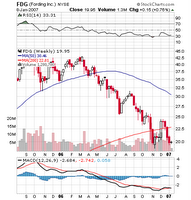
Fording Canadian Coal Trust (FDG-$19.95) is a royalty trust. The Trust, through its subsidiaries, holds a 46 percent interest in Neptune Bulk Terminals (Canada) Ltd. and a 60% interest in the Elk Valley Coal Partnership, which currently operates six Canadian mines in British Columbia and Alberta.
Elk Valley Coal’s operations employ conventional open pit mining techniques using primarily truck and shovel methods The majority of coal mined and processed at the Company’s operations is metallurgical hard coking coal for the global steel industry. Responsible for about one sixth of the global seaborne market supply, Elk Valley Coal is the second-largest supplier of its product in the world.
The Elk Valley Coal Partnership accounts for about 98 percent of the Trust's revenues.
Financial Highlights
For the nine-months ended September 30, 2006, net income from operations increased 5 percent from 2005 to $535 million, due to higher coal sales prices. Revenue increased 6 percent to $1.4 billion as average US dollar coal prices were up 25%, offset to some degree by lower sales volumes and a stronger Canadian dollar.
Challenges in coming quarters for Fording include lower average coal prices, new mines coming online from competitors, and global markets being flooded with coal of lesser quality.
Elk Valley’s average 2006 coal year prices for the period April 1, 2006, to March 31, 2007, across all coal products is expected to be approximately US$107 per ton compared with US$122 per ton for the 2005 coal year.
Elk Valley has entered into the early stage of volume and price negotiations for the coal year commencing April 1, 2007. High prices for hard coking coal have resulted in integrated steel mills using less hard coking coal to the extent their processes permit. While global steel production is at high levels, demand for hard coking coal is being adversely affected by the historically wide premium that is being charged for hard coking coals over prices for coals of lesser quality. This premium is encouraging the substitution by some integrated steel mills of lower quality—lower priced—coals at the expense of hard coking coals (which management blames for the 8 percent year-over-year decline in sales volumes).
The fundamental driver of hard coking pricing remains the supply-demand balance. The weekly mining letter, Creamer Media, says that the global integrated steel-mill production determines coking-coal demand. Global production of hot metal from blast furnaces is forecasted to grow from the current level of 700-million tons a year to 932-million tons a year by 2009, driven by Asian demand, with India and China the main contributors.
Competition
New sources of hard coking coal from competitors in Australia and Canada are coming on line, and will continue to do so over the next two or three years. While the projects are not large individually, they will add a significant amount of supply on a cumulative basis. Infrastructure constraints in Australia are being mitigated and additional capacity is being added to port and rail facilities.
Citigroup global commodity analyst Alan Heap says that the global supply and demand balance for coking coal is expected to see supply steadily rise to a peak in 2008 and fall back to a small surplus in 2009, with pricing easing to $100/ton next year.
Other commodity analysts suspect that future additional supply will pressure pricing further, with the current average price of $115 per ton drifting down to $75/ton by 2009.
Declining sales volumes + the tax fairness plan announced Oct. 31 by Canadian Finance Minister Jim Flaherty + shared sympathy with thermal coal mining/commodity companies (weakening energy prices) — all these factors contributed to the 44 percent drop in the share price of Fording in the last year.
Valuation Analysis
A share price selling for just 8.3 times 2007 earnings of $2.42, which is below both the Company’s four-year average of 11.9 times and the coal industry P/E 2007 (est.) of 12.2 times; an Enterprise Value/EBITDA (TTM) at a 53.8% discount to peer comparables (diversified metallurgical/thermal producers), 4.2 times vs. 9.1 times, respectively; and, an estimated forward annual dividend yield of about 11.5% (assuming a payout ratio of 95 percent) — the current valuation of Fording is unjustified, and presents a compelling inflection point for purchase.
A recent Associated Press story trumpeted, “Warm Winter Weather Hurting Shares of Arch Coal and Other Coal Miners.” As previously mentioned, no more than two percent of the Company’s top-line growth is derived from thermal coal.
The 10Q Detective has used the protracted weakness (because of bearish sentiment for steam coal companies) to buy 300 shares of Fording stock for our Model Portfolio.
Editor David J Phillips holds financial interests in several Canadian royalty income trusts, including Fording Canadian Coal Trust. The 10Q Detective has a Full Disclosure policy.
No comments:
Post a Comment